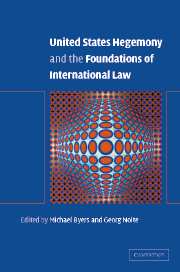Book contents
- Frontmatter
- Contents
- List of contributors
- Preface
- Introduction: the complexities of foundational change
- PART I International community
- PART II Sovereign equality
- PART III Use of force
- PART IV Customary international law
- PART V Law of treaties
- 13 The effects of US predominance on the elaboration of treaty regimes and on the evolution of the law of treaties
- 14 US reservations to human rights treaties: all for one and none for all?
- 15 Comments on chapters 13 and 14
- PART VI Compliance
- Conclusion
- Index
15 - Comments on chapters 13 and 14
Published online by Cambridge University Press: 13 July 2009
- Frontmatter
- Contents
- List of contributors
- Preface
- Introduction: the complexities of foundational change
- PART I International community
- PART II Sovereign equality
- PART III Use of force
- PART IV Customary international law
- PART V Law of treaties
- 13 The effects of US predominance on the elaboration of treaty regimes and on the evolution of the law of treaties
- 14 US reservations to human rights treaties: all for one and none for all?
- 15 Comments on chapters 13 and 14
- PART VI Compliance
- Conclusion
- Index
Summary
Jost Delbrück
As a preliminary remark, let me address the role of the United States as the sole remaining superpower. This position can hardly be disputed. However, the exceptional place of the United States in international relations and the ensuing attitude of that country must be put into context. It appears to me that a large segment of the international community, particularly within the Western camp, is quite content to accept the United States as being the troubleshooter bearing the brunt of major international enforcement actions. Second, in many cases this very segment of the international community has been less than vociferous when the United States has engaged in superpower unilateralism. Moreover, parts of the international legal community have put much effort into justifying such actions ex post facto. Thus, in a sense, this situation, together with the United States' sense of mission, has contributed to the predominance of the United States as it is perceived by the US administration and also by Congress. Pointing fingers from outside is, therefore, a somewhat dangerous undertaking. As the saying goes, some of the fingers may point back at the critics.
Yet, the stark fact is – and both authors of the chapters in this section have clearly said this – that the pursuit of the national interest is a dominant characteristic of US policy which, in turn, has an impact on the US approach to international law.
- Type
- Chapter
- Information
- United States Hegemony and the Foundations of International Law , pp. 416 - 424Publisher: Cambridge University PressPrint publication year: 2003



